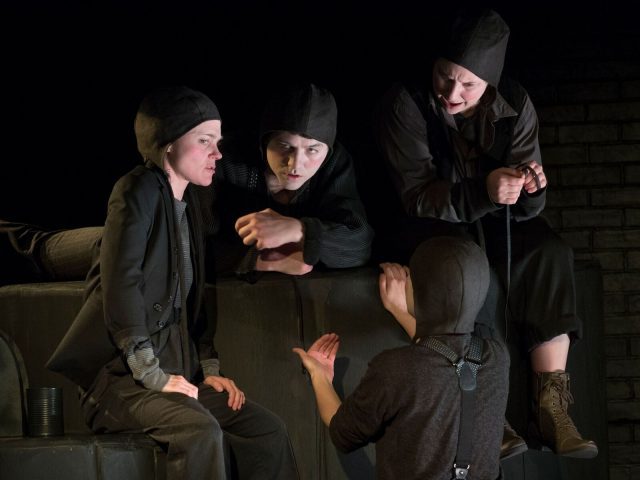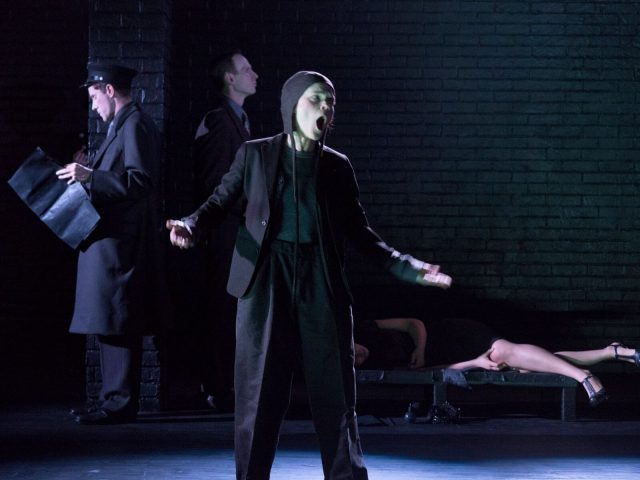
Local kids plot their next move in rare revival of Sidney Kingsley’s Dead End (photo by Pavel Antonov)
Axis Company
One Sheridan Sq. between West Fourth & Washington Sts.
Wednesday – Saturday through May 20, $15-$30, 8:00
866-811-4111
www.axiscompany.org
Axis Theatre Company artistic director Randy Sharp transports audiences back to depression-era New York to depict gentrification and income disparity in a dark and intimate revival of Sidney Kingsley’s 1935 Broadway hit, Dead End. The play, which ran at the Belasco for nearly two years, and the subsequent Oscar-nominated 1937 William Wyler film, starring Humphrey Bogart, Sylvia Sidney, Joel McCrea, and Claire Trevor, focus on a group of poor adolescent ruffians, originally played by the Dead End Kids (Leo Gorcey, Huntz Hall, Bobby Jordan, Gabriel Dell, Billy Halop, and Bernard Punsly, most of whom went on to become part of the Bowery Boys movie franchise), who hang out on dock pilings on the far east side of Manhattan. Virtually penniless, they goof around, making fun of one another in their thick accents (“Soich ’im,” “Hay’s fer hawses,” “What ah ya? A boy or a goil?”), and direct their scorn at just about anyone else who passes through their turf. When construction forces the wealthy people in a riverside luxury building to use the back door, where they come into contact with the tenement kids, a local hooker, and other undesirables, various conflicts ensue, illuminating the sharp contrast between the rich and the poor. “I’d rather see this from a distance,” the well-connected Griswald (Spencer Aste) tells his doorman, Jones (Brian Parks), upon seeing the “hoodlums.” Griswald’s prissy son, Phillip (Jake Murphy), then incites the boys. After Phillip brags to Jones that he spoke to his father in French, finishing with “Oui, oui,” Tommy (Jon McCormick) immediately jumps on that, declaring, “WEE WEE!!! He’s godda go wee wee!!” T.B. (Lynn Mancinelli), so-called because he has tuberculosis, challenges Phillip to swim in the East River, but Phillip refuses to go into the filthy water, preferring the indoor pool in his building. “Whassa mattah? Yuh scared yuh git a little doit on you?” Spit (Regina Betancourt) razzes him. They also pick on new kid Milty (Emily Kratter), a Jewish boy who wants to join their gang. Meanwhile, fellow resident Gimpty (George Demas), who went to college to become an architect but can’t find a job, recognizes an old fellow gang member, Baby Face Martin (Brian Barnhart), now a murderer on the run from the law who has returned home to visit his aging mother (Laurie Kilmartin) and his lost love, Francey (Katie Rose Summerfield). The only one with any sense, trying to do the right thing, is Tommy’s older sister, Drina (Shira Averbuch), who is raising Tommy by herself and wants to keep him out of trouble. But trouble knows how to find these unfortunate souls.

Angel, also known as T.B. (Lynn Mancinelli), makes a point in expressionistic drama at the Axis Theatre (photo by Pavel Antonov)
Lighting designer David Zeffren maintains a threatening darkness through most of the eighty-minute play, during which all of the actors congregate on Chad Yarborough’s spare set, which consists of pilings at stage left and a bed at the center back. Beat cop Mulligan (Phil Gillen), the doorman, and the Griswalds keep to stage right, attempting to stay away from the ruffians. Sharp (Last Man Club, Hospital) gives the production an expressionistic feel with elements of black humor while making it clear that not much has changed in the eighty-two years since the play debuted. The male and female actors playing the male gang members, all dressed in Karl Ruckdeschel’s black costumes with tight-fitting headpieces like an alternate version of nuns’ habits, have developed an infectious kinship, and Sharp effectively averts turning them into sympathetic victims or mere criminals. The heart of the story is the relationship between Gimpty, an architect unable to build anything (literally or metaphorically), and Kay (Britt Genelin), Phillip’s girlfriend, who has a soft spot for Gimpty and wants to help him, but rich and poor do not mix well in this world. “The place you live in is awfully important,” Gimpty tells Drina. “It can give you a chance to grow, or it can twist you. When I was in school, they used to teach us that evolution made men out of animals. They forgot to tell us it can also make animals out of men.” They also forgot to tell them that it’s not easy getting out of that dead end, in 1935 or 2017.